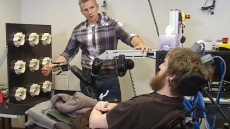If you consider yourself as a geeky guy, your dad's age at the time of your birth could have had a major part in forming your personality.
According to CNN, a study published in the journal, Translational Psychiatry, explores whether a man having children later in life means that his kids will be geeky.
The study surveyed 7,781 twins and found that being geeky was 57 percent inherited from the parents, particularly in male children with older fathers.
The children were assessed at the age of 12 on their nonverbal intelligence, restrictive and repetitive behaviours, and social aloofness.
Their scores were put together to form a 'geek index,' and those who were ranked the highest had higher IQs, stronger focus levels and less concern about fitting in with others.
The study noted that 'geek' is typically an umbrella term for people who tend to be socially awkward and overly intellectual.
The geek index started visibly rising in those with fathers who were older than 35 at the child's conception.
According to the research, males with fathers who were older than 50 at conception were 32 percent more likely to score higher on exams in STEM subjects than the offspring of fathers who were under 25.
Females with older fathers who were surveyed did not score significantly high on the geek index.
Study's co-author and a fellow at the Seaver Autism Center for Research and Treatment at Mount Sinai, Magdalena Janecka, noted that this could have to do with the way the study defined geekiness.
It may not have captured the geeky characteristics of females. Females also might have a biological quality that resists these traits, she shared.
Janecka said, "I think it's quite important that we can relieve the stigma for older fathers. It's important to add something positive to that and to make older fathers not feel guilty about how their kids do in life."

She believed that 57 personality inheritability of geekiness is a combination of the parents' geeky traits that are passed down, as well as mutations that occur in the sperm of older fathers.
These mutations happen as the father gets older and his sperm continues to reproduce, creating more opportunities for error in DNA replication.
Although the study detected a presence of the mutations, Janecka said the researchers believe that the geekiness is mostly a result of familial traits.
"Men who decide to have a child at an advanced age, they are somewhat different. It's not like the normal population of men having children. They stay in education for a longer period of time, they focus on their job till later in life, or they are socially maybe less skilled than men who decide to have children earlier," shared Janecka.
According to her, if these men decided to have a child at a younger age, they would still have a higher chance of producing a child with geeky traits, since they themselves are geeky.
Dolores Malaspina, a professor of psychiatry at New York University Langone Medical Center who was not involved in the study, disagrees.
"I think that the men who are having children older are not necessarily odder. Years ago, we saw an increase of schizophrenia to later-born children, and before they accepted that it might be the fathers, they thought it was cold mothers who were busy. So we used to want to blame schizophrenia of people with older parents on cold mothers. I don't want to blame these conditions in children of older parents on the parents being odd," noted Malaspina.
Malaspina and her colleagues came out with the first study in 2001 that showed advanced paternal age's effect on schizophrenia in children. They found that a quarter of all schizophrenia was related to the age of the father.
Malaspina concluded by saying, "One hundred-fifty thousand years ago, some mutation made human brains different. And that was a good mutation, and like other mutations, it probably came from a paternal gene. So what they want to point out is that even though the age of the father can predict mutations, maybe some of those aren't so bad. And I would agree with that."




